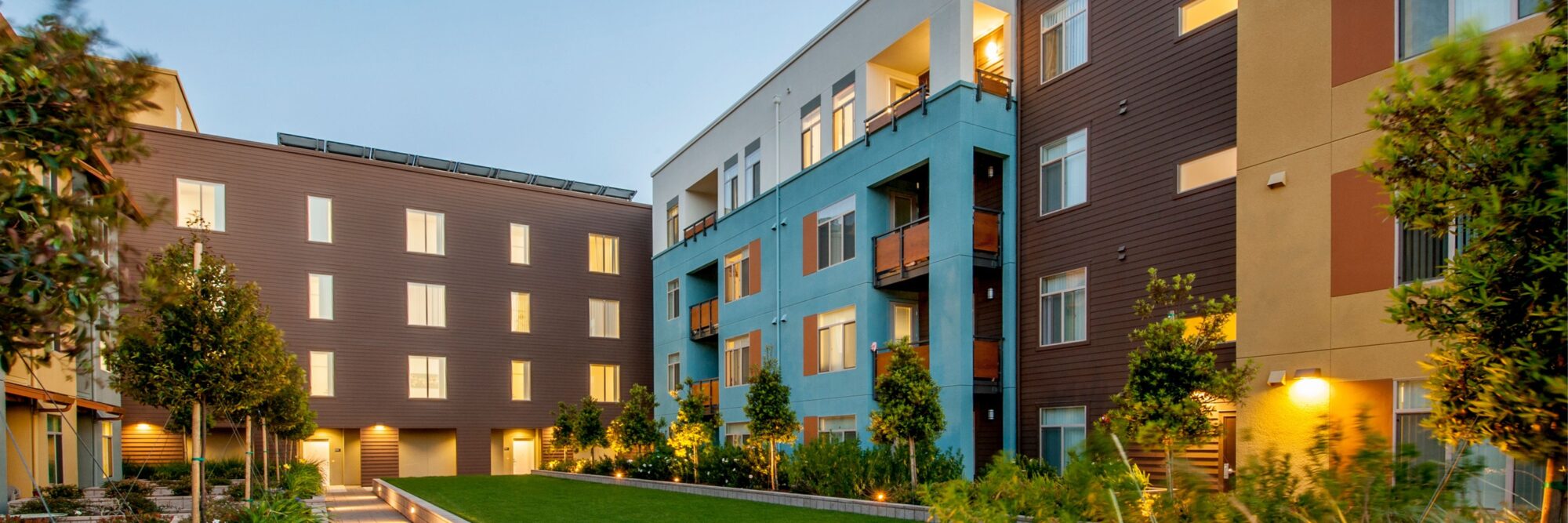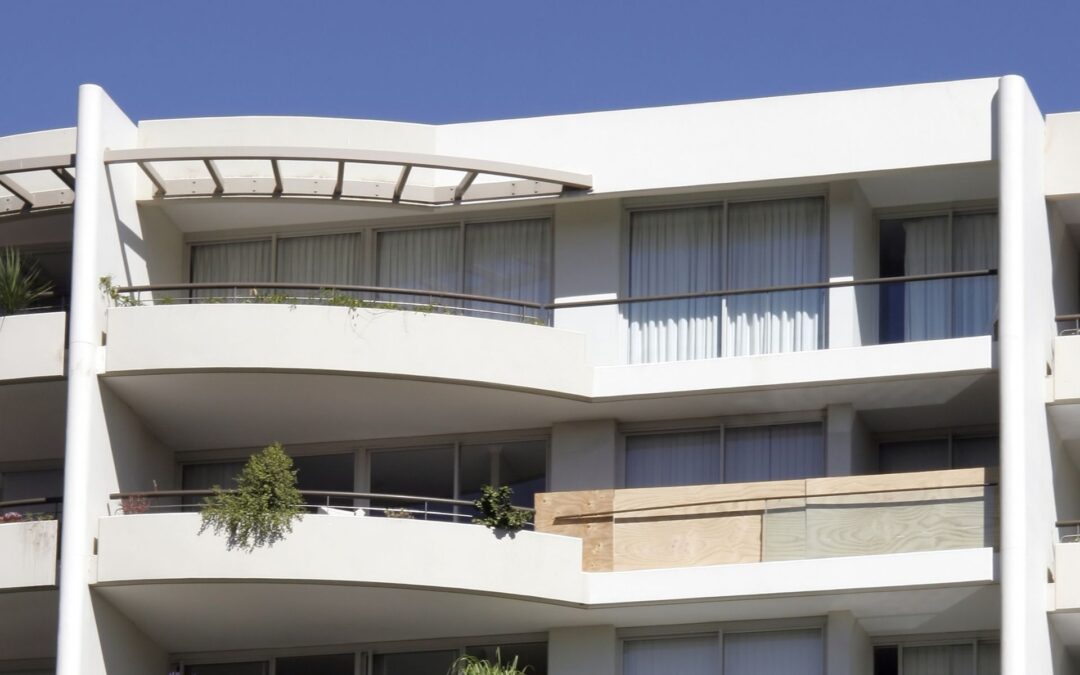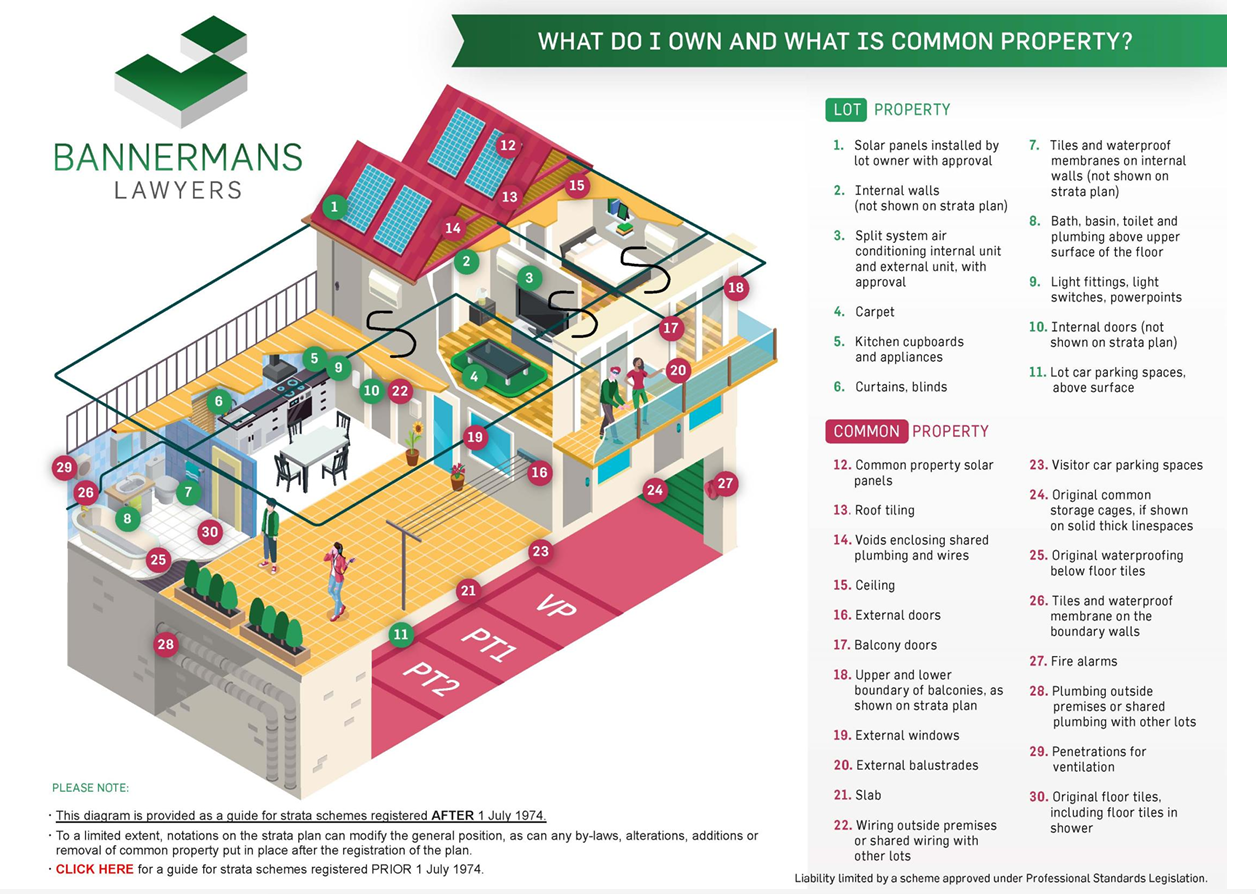Purchasing a strata-titled property, be it an apartment, townhouse, or villa, offers a unique blend of private ownership and shared community living. While it can be an excellent entry point into the property market, it’s essential to understand the distinct responsibilities that come with strata ownership in New South Wales.
1. Understanding Strata Ownership: What You Own vs. What You Share
When you buy into a strata scheme, you own your individual lot (such as your apartment or townhouse). However, you also share ownership of common property areas with other lot owners. These shared spaces typically include:
- External walls
- Roofs
- Driveways
- Stairwells
- Gardens
As a lot owner, you automatically become a member of the owners corporation, which is responsible for managing and maintaining these common areas.
Bannermans Lawyers have developed this simple guide to help clarify the difference between common property and what falls under the responsibility of the lot owner. Please keep in mind that this is a general reference and applies to strata schemes registered after 1 July 1974. It may not reflect variations in individual schemes, such as approved by-laws or any changes made to the common property, like additions, alterations, or removals, after the original plan was registered.
For schemes registered prior to 1 July 1974, click here.
2. Strata Levies: Your Financial Contributions
Owning a strata property involves regular financial contributions, known as strata levies, which are used to cover various expenses, these are generally charged quarterly and will combine payments into these two different funds:
- Administrative Fund: Covers day-to-day operational costs like your strata management, building insurance, cleaning and gardening.
- Capital Works Fund: Allocated for long-term maintenance and major repairs.
Other intermittent financial contributions may include:
- Special Levies: Payments for unexpected or significant expenses not covered by the other funds, most of the time this is for larger maintenance or repair projects around the block, this could also include upgrades to comply with legislation or local council orders such as the Annual Fire Safety Statement for the complex.
What happens if I don’t pay my strata levies?
- Loss of voting rights: You can’t vote at meetings while in arrears. (This occurs if you are even 1 day or $1 behind)
- Interest charges: If you do not pay levies within one month or the payment due date, you can be charged interest up to 10% per year on overdue amounts.
- Debt recovery: The owners corporation also have the right to recover ‘reasonable costs’ associated with recovering unpaid levies. (e.g. debt collection services, legal services, reminder notice postage and any other expenses related to the recovery process.
- Issues with selling/refinancing: Debts must be cleared before settlement and / or can be taken out upon settlement.
As of July 2025, new laws also require strata levy notices to include clearer information, helping owners better understand their financial obligations.

3. By-Laws: The Rules of Strata Living
Each strata scheme operates under a set of by-laws that govern the behaviour of residents and the use of common property. They help maintain safety, order and fairness within the community.
Each strata scheme has its own set of by-laws. These can be based on the modal by-laws put forward by the government, created specifically for the building, or a combination of both, depending on what the owners corporation decides.
These rules can cover:
- Noise restrictions
- Pet ownership
- Renovation guidelines
- Use of shared facilities
- Short term rental accommodation (AirBnb)
If you’re considering buying a strata property, you should review the scheme’s by-laws and, if applicable, the management statement. These documents must be included in the contract of sale, which you can request from the seller or their agent.
4. Due Diligence: Reviewing Strata Records
Before finalising your purchase, it’s crucial to conduct thorough due diligence, and a key part of that is understanding the difference between strata inspection reports and building inspections, particularly if you’re buying a strata-titled property like an apartment, townhouse or villa.
A strata inspection report is essential for these types of properties. It reviews the records held by the owners corporation and provides valuable insight into how the building is being managed. This includes the financial position of the strata, upcoming or overdue maintenance, special levies, known defects, legal disputes, insurance cover, and compliance with key regulations. The report also includes minutes from previous meetings, which can reveal any ongoing issues or concerns within the building. Essentially, it helps identify anything out of the ordinary and gives you a clear picture of the potential risks or future costs that could affect your ownership.
In contrast, a building inspection focuses on the physical condition of a property. While it’s more commonly required for freestanding homes, it may still be worthwhile for certain strata properties, particularly older buildings or those with features like courtyards or rooftop areas that fall under individual ownership. A building inspection checks for structural problems, water damage, pest activity, and general wear and tear.
If you’re buying a strata property, a strata report is a must. A building inspection isn’t always necessary but can be helpful depending on the type and condition of the property. At PMC, we will also review these reports with you and your legal representative to ensure you are fully informed before you buy.

5. Renovations: Navigating Approvals
While you have the freedom to make some changes within your lot, certain renovations may require approval:
- Cosmetic Work: Typically doesn’t need approval (e.g., painting walls, replacing soft flooring like carpet or installing curtains or blinds).
- Minor Renovations: May require notification or approval, depending on the by-laws. (e.g. installing air-conditioning, replacing hard flooring or installing ceiling fans)
- Major Renovations: Usually need formal approval from the owners corporation in many cases these will need a special resolution at an Extraordinary General Meeting and will require a registered by-law to be created. This by-law will outline the approved work and who is responsible for future maintenance. (nsw.gov.au) (These works include renovations such as removing or altering structural walls, changing waterproofing & relocating plumbing)
Under the new laws effective July 2025, if a strata committee doesn’t respond to a minor renovation request within a specified timeframe, the approval is automatically granted, streamlining the process for owners.
6. Strata Management: Roles and Responsibilities
Understanding who manages your strata scheme is vital:
- Owners Corporation: Comprises all lot owners and makes key decisions about the scheme.
- Strata Committee: Elected by the owners corporation to handle day-to-day management.
- Strata Manager: A professional appointed to assist with administrative tasks and ensure compliance with laws.
7. Community Living: The Social Aspect
Living in a strata scheme means being part of a community. It’s important to consider:
- The culture and dynamics of the residents
- Participation in meetings and decision-making processes
- Communication and conflict resolution mechanisms
Engaging with your neighbours and being active in the owners corporation can enhance your living experience and contribute to a harmonious community.
8. Thinking of buying a new build strata property in NSW?
If you’re buying a new strata title apartment in NSW, it’s important to know that builders must provide warranties covering major structural defects for six years and minor defects for two years, starting from when the building is completed or the occupancy certificate is issued. These warranties protect you against serious issues like structural faults and waterproofing failures, as well as smaller problems such as paint or tiling defects. The Owners Corporation usually manages warranty claims for common areas, while individual owners handle defects inside their apartments. Getting a professional defects inspection early can help you spot issues and ensure your rights are protected.

Final Thoughts
Buying into a strata property comes with many benefits, convenience, shared amenities, and often a more affordable entry point into great locations. But it also comes with layers of legal, financial, and practical complexity that shouldn’t be overlooked. At PMC Property Buyers, we help you navigate this with confidence. Our experienced team conducts thorough due diligence on your behalf, reviewing strata records, identifying red flags, and ensuring you’re buying into a well-managed, financially sound building. Whether you’re a first-home buyer or a seasoned investor, we’re here to guide you every step of the way so you can make an informed, secure decision.
For the full NSW Fair Trading Strata Living Guide, click here.

